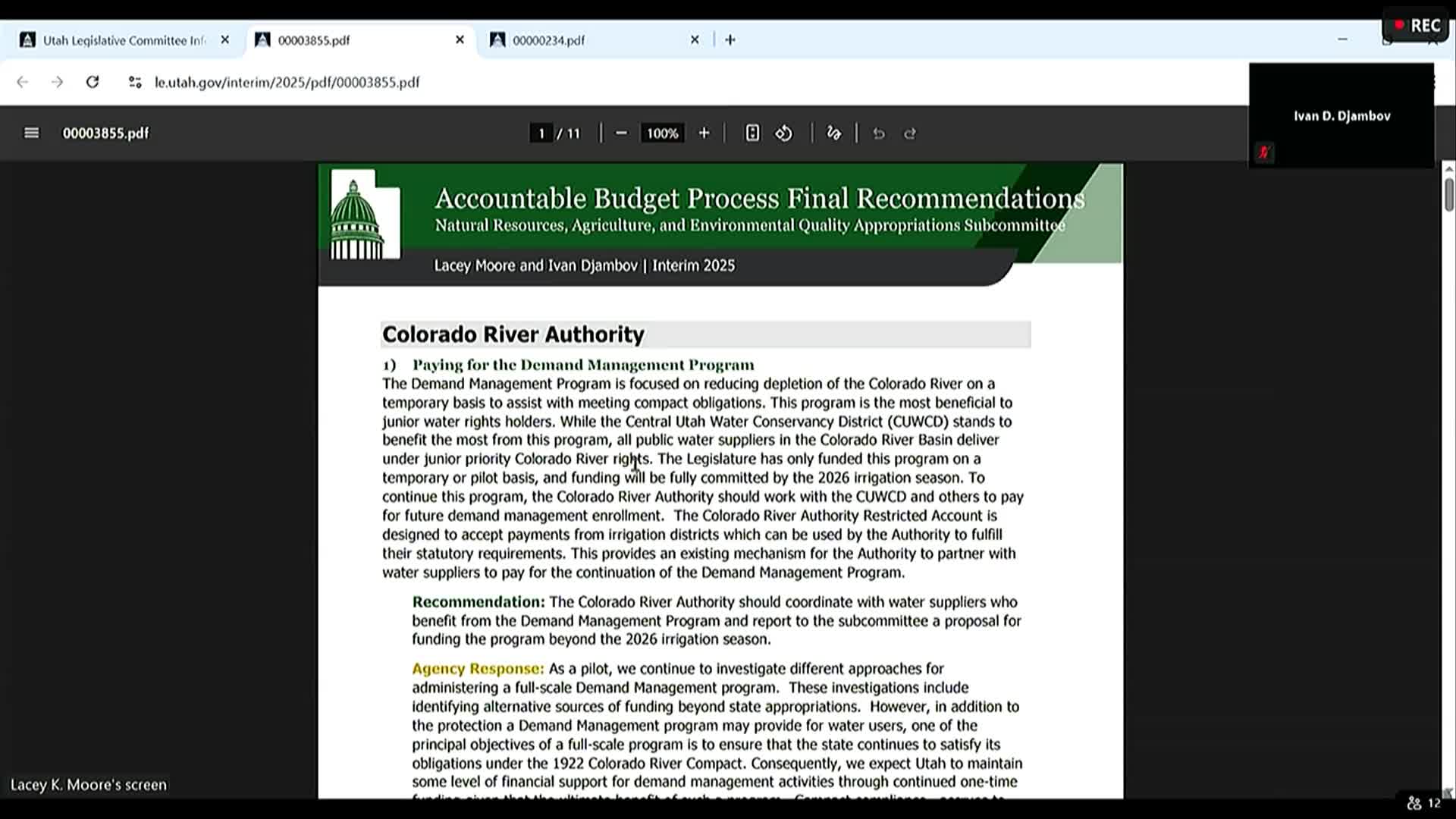Subcommittee approves package of natural-resources budget and policy recommendations; asks Colorado River Authority for funding plan
Get AI-powered insights, summaries, and transcripts
Subscribe
Summary
The Natural Resources, Agriculture and Environmental Quality Appropriations Subcommittee approved a slate of recommendations and directed staff to draft the subcommittee’s base budget bill, including requests that the Colorado River Authority propose ongoing funding for its demand-management pilot and that several agencies improve permitting, data and wildfire accounting.
The Natural Resources, Agriculture and Environmental Quality Appropriations Subcommittee approved a slate of recommendations and directed staff to draft the subcommittee’s base budget bill. The committee voted to ask the Colorado River Authority of Utah (CRAU) to return with a proposal for ongoing funding for the demand-management pilot and to develop more robust criteria for the program prior to the 2026 irrigation season. The committee also approved administrative and budget-related recommendations for multiple agencies, adopted line-item performance measures for fiscal 2027, and authorized legislative staff to include the approved changes in the subcommittee’s base budget bill.
Why it matters: the package affects state water negotiations, wildfire accounting and response, forest and sovereign-lands management, oil-and-gas permitting, and Great Salt Lake accounting and measurement. Several actions also direct agencies to report back with implementation plans or follow-up information for the Legislature.
Colorado River demand-management: the subcommittee approved two recommendations for the Colorado River Authority. First, it asked CRAU to coordinate with water suppliers that would benefit from demand-management and to return to the subcommittee with a proposal for funding the program beyond the 2026 irrigation season (the program was funded previously with one-time state dollars). Second, the committee requested that CRAU develop a proposal to amend the pilot’s enrollment criteria to address diversion, depletion and surface-management provisions for 2026 applicants. Amy Haas, executive director of the Colorado River Authority of Utah, clarified the scope of the request: “no, this would not give us jurisdiction to approve reservoirs or reservoir storage” (regarding whether the authority would gain approval power over future state reservoirs).
Utah Water Agent and other administrative moves: the committee approved a recommendation to move the Utah Water Agent funding and personnel from the governor’s office to the Department of Natural Resources so that operations and budget lines align. Committee materials note that Joel Ferry has been appointed as Utah Water Agent and that staff are already housed in DNR; the vote directs the budget transfer to match operations.
Wildfire, forestry and sovereign-lands actions: the panel approved recommendations to consolidate and report wildfire revenues and costs in the new Utah Wildfire Fund, to make technical corrections to ongoing appropriations created in House Bill 307, to streamline appropriation units inside the Division of Forestry, Fire and State Lands, to develop performance measures for sovereign-lands management (for example, phragmites removal or treatment metrics), to simplify fee schedules, and to align vehicle assignments with the operating units that use them.
Oil, gas and mining recommendations: the committee adopted a group of recommendations aimed at modernizing permitting and data practices for the Division of Oil, Gas and Mining. Recommendations include improved communications about a permitting-system upgrade; a live permitting dashboard for applicants; continued efforts to reduce permit turnaround time; expanded public databases and a public-facing data warehouse; cross-training and inspection coordination with the Department of Environmental Quality and Bureau of Land Management; producing joint online permit forms with the BLM where feasible; updating rules to accommodate modern mapping and compliance technology; and improved reporting on performance measures. The subcommittee also recommended eliminating a small ($84,000) nonlapsing program that aggregated nonlapsing appropriations, and it asked the division to present plans for improving performance-measure results.
Line-item performance measures and final action: staff presented a dynamic dashboard and a static table of line-item performance measures; the subcommittee voted to approve the proposed measures and targets for fiscal 2027. After adopting the measures and the individual recommendations, the committee approved a final, required motion directing legislative staff to draft the base budget bill that includes the recommendations, ongoing appropriations as defined by the current appropriation act, federal funds, dedicated credits and restricted funds at the lesser of current-year ongoing appropriations or agency budget requests, and adjustments to nonlapsing balances and dependent amounts. The motion also authorized staff, in consultation with co-chairs, to make technical changes, including balancing among general fund and income-tax fund lines.
Votes at a glance (motions approved, unanimous unless noted): - Recommend Colorado River Authority develop funding proposal and amended criteria for demand management (items 1–2): approved (unanimous). - Move Utah Water Agent budget and operations to Department of Natural Resources (item 3): approved (unanimous). - Support WRI code removal and evaluation of restoration programs (items 4–5): approved (unanimous). - Forestry, Fire and State Lands recommendations 6–11 (wildfire fund accounting, appropriation cleanup, sovereign-lands metrics, fee simplification, vehicle assignment): approved (unanimous). - Division of Oil, Gas and Mining recommendations 12–24 (permitting, data, dashboards, cross-training, fee accounting): approved (unanimous). - Approve line-item performance measures and targets for fiscal 2027: approved (unanimous). - Final authorization to legislative staff to include adopted recommendations in the subcommittee base budget bill and make technical adjustments (item 25, motion under joint rule references): approved (unanimous).
What’s next: several motions directed agencies to return with more detailed proposals or reports. The Colorado River Authority was asked specifically to return with a funding proposal and stronger criteria before the 2026 irrigation season. Legislative fiscal staff said it will follow up on permitting and data-work items and that the department-level reporting on fee changes and implementation will be visible during the general session fee reviews and next interim budgets.
The committee recorded its votes as unanimous on the motions summarized above; no roll-call tallies were read into the record.
